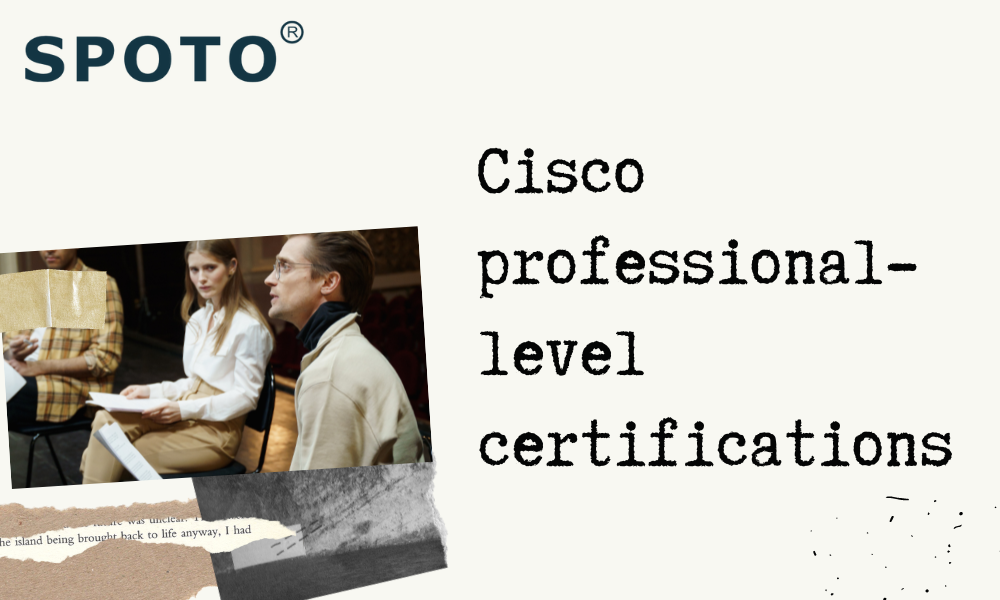Cisco professional-level certifications

Cisco professional-level certifications
Cisco offers two professional-level credentials: the Cisco Certified Network Pro (CCNP) and the Cisco Certified Design Pro ( CCDP). You must pass three certification exams to obtain the CCDP.
Four exams are required for all CCNP solution tracks except Routing and Switching. Three exams are necessary to earn the CCNP Routing and Switching credential. All CCNP solution tracks require either the lower-level CCNA credential or any CCIE credential. As a prerequisite, the CCNP: Service Provider credential accepts Cisco Certified Internet Professional (CCIP), which was retired in 2012.
The CCNP credential is for professionals who design, implement, and troubleshoot networks in local and large areas. Except for Cyber Ops and Industrial, the CCNP tracks are identical to those of the CCNA. You are highly recommended to obtain the CCNP to move up to the Cisco Certified Internetwork Expert.
The CCDP certifies proficiency in designing and deploying scalable networks and multilayer switched networks. You can then move on to become a Cisco Certified Design Expert.
Cisco's expert-level certifications
Cisco's top-level credentials include two main certifications: the highly coveted Cisco Certified Internetwork Experts (CCIE) and the Cisco Certified Design Experts (CCDE). Both certificates do not require prerequisites. However, one must pass both a written and practical exam to be awarded either.
Cisco added an evolving technology domain to its expert-level exams in July 2016. It accounts for 10% of the exam score and targets network programmability, cloud, and IoT. Cisco could change the topics in this domain to reflect new technologies with enough commercial potential, presence, and interest to be exam worthy. This is a company-wide mechanism to future-proof its certifications, so employers can assume that people with current credentials are up to date on new networking technologies.
Many network-track professionals consider the CCIE the highlight of their career. A CCIE is a professional with expert technical skills and knowledge about Cisco network products and solutions. Currently, the tracks include Collaboration, Data Center, Routing and Switching, Security, Provider, and Wireless.
The CCDE identifies professionals who design infrastructure solutions in large enterprise environments. This includes technological, business, and budget aspects.
Cisco's architect-level certificates
The Cisco Certified Architect ( CCAr) certification is a smart choice for those looking to be network architects or data center architects. CCAr is the Cisco Career Certification Program's Ph.D. It is the highest Cisco certification. This credential validates the skills and abilities of a senior network architect who can plan and design IT infrastructures based on business strategies. The CCAr is a challenging certification.
It would help if you first designed a network solution that implements a given strategy to earn the CCDE certification. Then, you will have to defend your answer before a Cisco-appointed panel.
Similar careers and jobs
No matter your career path, there are many job opportunities for Cisco professionals. Cisco certifications can help IT professionals prepare for various roles in Cisco. SimplyHired or Indeed have a search function that allows you to find Cisco CCNA professionals. You will find between 7,500- 9,500 job openings.
Many factors can affect job opportunities, including experience and whether or not you are focused on network operations. Although not comprehensive, the following list highlights some of the most common certification-related job opportunities:
- CCENT - Help desk or technician positions
- CCT - Engineer (field, network support, application support) or system administrator
- CCNA Engineer (network and telecommunications), technician, or analyst (network operations center).
- CCDA - Engineer (network system, design, lead), analyst, interface developer, or technical specialist
- CCNP Network administrator, engineer (support and network), or advanced technician. There are also senior-level positions.
- CCDP - Senior-level roles: senior network engineer, senior analyst, cybersecurity analyst, or network designer
- CCIE: Expert-level roles; network architect, engineer (lead, systems, network), or senior network administrator
- CCDE: Expert-level roles; systems engineer, senior network engineer, network architect, network design engineer, or IT infrastructure team lead
- CCAr Architect (pointer and network, enterprise voice data, voice data, and more)
Training and resources
SPOTO has compiled a list of self-study and training resources. These resources include practice exams, online learning, and learning labs. Links to these resources are available on the certification's website. SPOTO provides candidates with a basic membership, including access to exam topics and IT training videos, study groups, forums, study material, and many other benefits. Professionals can access the subscription-based , which provides on-demand learning, more than 400 courses, and hands-on virtual labs, as well as a support library and other resources. Additional training materials can be found at SPOTO.
